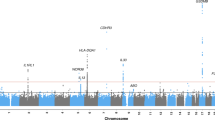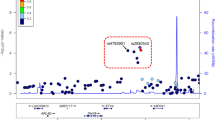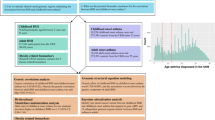Abstract
The first common genetic factor identified for pediatric asthma by genome-wide association is the chromosome 17q21 locus, harbouring the ORMDL3 gene. ORMDL3 is involved in facilitation of endoplasmic reticulum-mediated inflammatory responses, believed to underlie its asthma association. We investigated associations between the rs7216389 polymorphism in the 17q21 locus affecting ORMDL3 expression and the risk for recurrent wheeze and interactions with exposure to tobacco smoke and furred pets during pregnancy and infancy using a birth cohort of 101 042 infants. Rs7216389 was significantly associated with recurrent wheeze risk among 18-month-old infants. There was a 1.35-fold higher risk of recurrent wheeze among homozygous variant allele carriers compared with homozygous wild-type allele carriers. There was significant interaction between rs7216389 and domestic furred pets, with a positive association between pets and wheeze among homozygous wild-type carriers and a negative association among homozygous variant allele carriers. There was no interaction between rs7216389 and tobacco smoke exposure.
This is a preview of subscription content, access via your institution
Access options
Subscribe to this journal
Receive 6 digital issues and online access to articles
$119.00 per year
only $19.83 per issue
Buy this article
- Purchase on Springer Link
- Instant access to full article PDF
Prices may be subject to local taxes which are calculated during checkout
Similar content being viewed by others
References
Martinez FD, Wright AL, Taussig LM, Holberg CJ, Halonen M, Morgan WJ . Asthma and wheezing in the first six years of life. The Group Health Medical Associates. N Engl J Med 1995; 332: 133–138.
Moffatt MF, Kabesch M, Liang L, Dixon AL, Strachan D, Heath S et al. Genetic variants regulating ORMDL3 expression contribute to the risk of childhood asthma. Nature 2007; 448: 470–473.
Bouzigon E, Corda E, Aschard H, Dizier MH, Boland A, Bousquet J et al. Effect of 17q21 variants and smoking exposure in early-onset asthma. N Engl J Med 2008; 359: 1985–1994.
Bisgaard H, Bonnelykke K, Sleiman PM, Brasholt M, Chawes B, Kreiner-Moller E et al. Chromosome 17q21 gene variants are associated with asthma and exacerbations but not atopy in early childhood. Am J Respir Crit Care Med 2009; 179: 179–185.
Moffatt MF, Gut IG, Demenais F, Strachan DP, Bouzigon E, Heath S et al. A large-scale, consortium-based genomewide association study of asthma. N Engl J Med 2010; 363: 1211–1221.
Breslow DK, Collins SR, Bodenmiller B, Aebersold R, Simons K, Shevchenko A et al. Orm family proteins mediate sphingolipid homeostasis. Nature 2010; 463: 1048–1053.
Cantero-Recasens G, Fandos C, Rubio-Moscardo F, Valverde MA, Vicente R . The asthma-associated ORMDL3 gene product regulates -mediated calcium signaling and cellular stress. Hum Mol Genet 2010; 19: 111–121.
Chen CM, Tischer C, Schnappinger M, Heinrich J . The role of cats and dogs in asthma and allergy--a systematic review. Int J Hyg Environ Health 2010; 213: 1–31.
Sørensen M, Allermann L, Vogel U, Andersen PS, Jespersgaard C, Loft S et al. Polymorphisms in inflammation genes, tobacco smoke and furred pets and wheeze in children. Pediatr Allergy Immunol 2009; 20: 614–623.
Linneberg A, Simonsen JB, Petersen J, Stensballe LG, Benn CS . Differential effects of risk factors on infant wheeze and atopic dermatitis emphasize a different etiology. J Allergy Clin Immunol 2006; 117: 184–189.
Bisgaard H, Hermansen MN, Loland L, Halkjaer LB, Buchvald F . Intermittent inhaled corticosteroids in infants with episodic wheezing. N Engl J Med 2006; 354: 1998–2005.
Flory JH, Sleiman PM, Christie JD, Annaiah K, Bradfield J, Kim CE et al. 17q12-21 variants interact with smoke exposure as a risk factor for pediatric asthma but are equally associated with early-onset versus late-onset asthma in North Americans of European ancestry. J Allergy Clin Immunol 2009; 124: 605–607.
Acknowledgements
EVB was supported by a Research Grant from the Danish Medical Research Council. The project was supported by the Danish Agency for Science, Technology and Innovation, as part of the Danish Centre of Excellence on Air Pollution and Health, AIRPOLIFE (Grant 2052-03-0016) and Center for Indoor Air and Health in Dwellings, CISBO. The Danish National Research Foundation has established the Danish Epidemiology Science Centre that initiated and created DNBC. The cohort is furthermore a result of a major grant from this foundation. DNBC was further supported by the Pharmacy Foundation, the Egmont Foundation, the March of Dimes Birth Defects Foundation, the Augustinus Foundation and the Health Foundation.
Author information
Authors and Affiliations
Corresponding author
Ethics declarations
Competing interests
The authors declare no conflict of interest.
Additional information
Supplementary Information accompanies the paper on Genes and Immunity website
Supplementary information
Rights and permissions
About this article
Cite this article
Bräuner, E., Loft, S., Raaschou-Nielsen, O. et al. Effects of a 17q21 chromosome gene variant, tobacco smoke and furred pets on infant wheeze. Genes Immun 13, 94–97 (2012). https://doi.org/10.1038/gene.2011.51
Received:
Revised:
Accepted:
Published:
Issue Date:
DOI: https://doi.org/10.1038/gene.2011.51
Keywords
This article is cited by
-
Lessons from ten years of genome‐wide association studies of asthma
Clinical & Translational Immunology (2017)
-
Review of Environmental Impact on the Epigenetic Regulation of Atopic Diseases
Current Allergy and Asthma Reports (2015)



